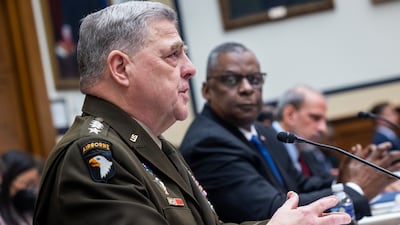Live updates: follow the latest news on Russia-Ukraine
The US should build permanent military bases in Eastern Europe, the Pentagon's top officer said on Tuesday, as the West looks to adapt its security posture after Russia's invasion of Ukraine.
Chairman of the Joint Chiefs of Staff Gen Mark Milley said countries in the region including Romania, Poland and the Baltics were “very willing” to have the permanent bases.
“They'll build them, they'll pay for them,” Gen Milley said at a House Armed Services Committee alongside Secretary of Defence Lloyd Austin.
Gen Milley said the bases should have expeditionary forces rotate through them instead of permanently deployed units.
“My advice would be to create permanent bases, but don’t permanently station,” he said. “You get the effect of permanence by rotational forces.”
The US currently has troops deployed across Eastern Europe and nearly 100,000 across the continent. While it has permanent bases across Western Europe, US troops in the East are rotated through facilities run by ally countries.
Gen Milley said US bases would cut costs for American troops in terms of living expenses. Several Eastern European countries including Kosovo, Lithuania, Poland and Romania have expressed greater interest in the past two months in hosting US troops on their territory.
Kosovo said it is amenable to discussing a permanent US military base.
Mr Austin said such a decision would come after consultations with Nato.
“If Nato deems it’s appropriate to change its footprint, then certainly we’ll be a part of that,” he said.
He expected those discussions to happen at Nato’s next summit in June.
“We will defend every inch of Nato territory if required,” Mr Austin added, as he vowed continued US military support for Ukraine.
Asked about lessons from Ukraine war's first 40 days, Mr Austin credited Ukrainian troops for countering Russian attacks.
“We have learnt that a determined force can do tremendous work in terms of defending itself, and the Ukrainians demonstrate that each and every day,” Mr Austin said.
He attributed some of that resilience to US weaponry.
“We've seen them again blunt the advance of a far superior force with respect to the Russians in terms of numbers and capability by using the right types of techniques and the right weapon systems; the Javelin, the Stingers are proven to be very effective in the fight.”
Gen Milley said the capability of US intelligence gathering and transmission is another lesson from the war.
“We've had extraordinary intelligence all throughout and the intelligence sharing that we've enabled Ukraine to see … the ability of us to transmit information that is useful to Ukraine has been enormously helpful,” the US commander said.
But Gen Milley warned of the gravity of the challenge that Russia’s war poses to the US-backed global order.
“We are now facing two global powers, China and Russia, each with significant military capabilities”, he said.
“We are witnessing the greatest threat to peace and security of Europe, perhaps the world in my 40 years of service and in uniform.”
Asked if Russian President Vladimir Putin could have been deterred from invading on February 24, Gen Milley argued that it would have required a US troop presence in Ukraine, which risked sparking a US-Russia conflict.
“Candidly, short of the commitment of US military forces into Ukraine proper, I'm not sure he was deterrable.”

































































